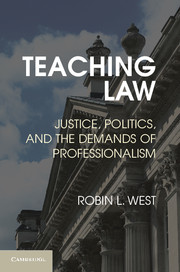Book contents
- Frontmatter
- Dedication
- Contents
- Acknowledgment
- Introduction The Trouble with Law Schools
- 1 The Unbearable Lightness of Justice
- 2 Politics and Its Discontents
- 3 The Bifurcated Academy: The Practice versus the Study of Law
- 4 Confronting Our Existential Challenge
- Some Conclusions
- Bibliography
- Index
- References
4 - Confronting Our Existential Challenge
Published online by Cambridge University Press: 05 June 2014
- Frontmatter
- Dedication
- Contents
- Acknowledgment
- Introduction The Trouble with Law Schools
- 1 The Unbearable Lightness of Justice
- 2 Politics and Its Discontents
- 3 The Bifurcated Academy: The Practice versus the Study of Law
- 4 Confronting Our Existential Challenge
- Some Conclusions
- Bibliography
- Index
- References
Summary
Some of the lessons to draw from the legal academy’s current constellation of crises – economic, professional, and existential – are self-evident. For ethical and legal reasons both, law schools must be transparent in the information they give applicants and the public regarding the rates of employment and starting salaries of their graduates. They must give their graduates a degree with greater value than it currently possesses in the saturated market for lawyers, and to do so they must stop flooding the market with twice the number of graduates as there are jobs. What that means operationally is that some law schools may close and that law schools that continue to operate must shrink their class size. Only by so doing will the “return on investment” of the law degree begin to rise. The schools must then absorb the loss of revenue, in part by cutting salaries and raising teaching loads. But the bottom line is simply that law schools must deliver an education and a degree to students who can reasonably expect to become lawyers when they graduate. Virtually all law faculty and administrators now know this, even if they did not know it, or were willfully blind to it, or were consciously deceitful regarding it, at the beginning of the academy’s various economic crises about five years ago.
- Type
- Chapter
- Information
- Teaching LawJustice, Politics, and the Demands of Professionalism, pp. 174 - 207Publisher: Cambridge University PressPrint publication year: 2013



